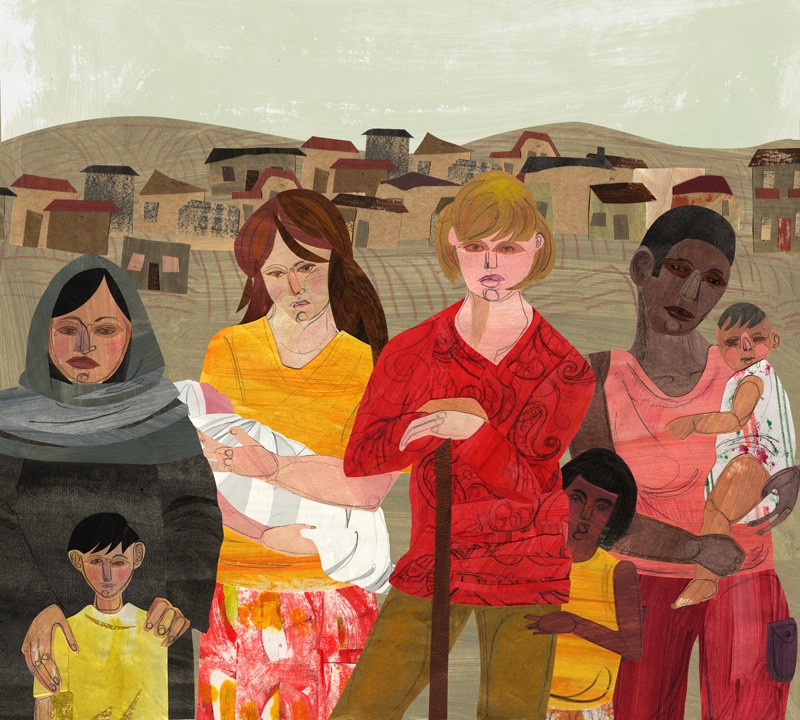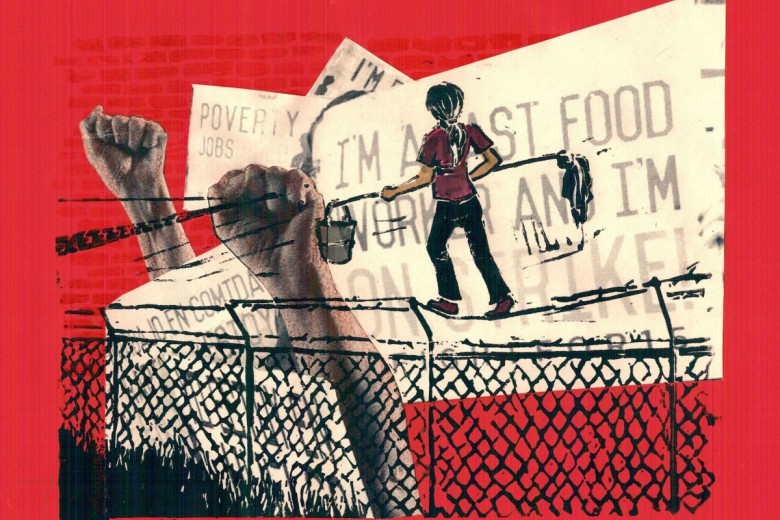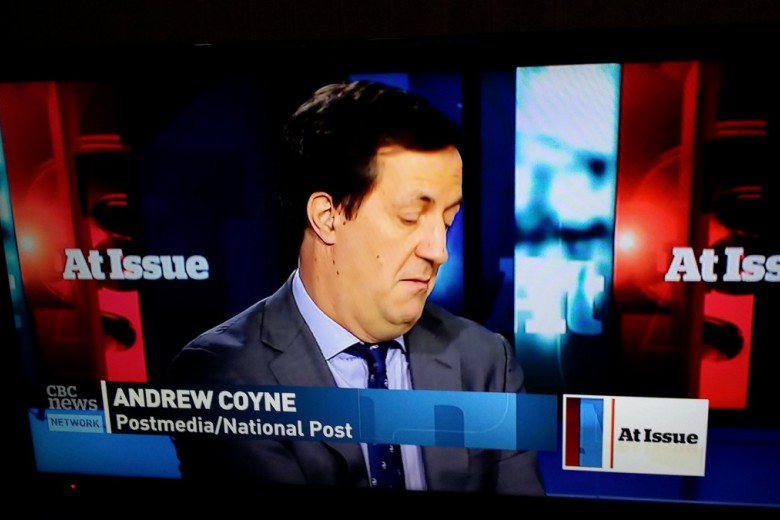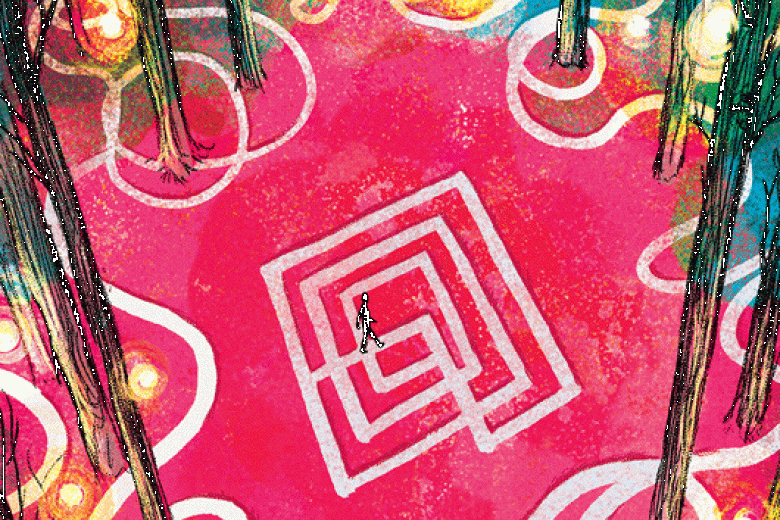
“For those who dominate and oppress us benefit most when we have nothing to give our own, when they have so taken from us our dignity, our humanness that we have nothing left, no ‘homeplace’ where we can recover ourselves.” — bell hooks
Homeplace is where we are grown and raised into social beings, where we receive our earliest definitions of humanity, where we first learn to recognize love, violence, justice and pain. Yet it has persisted in our imagination as a private sphere of emotional and material dependence, rather than as a front in revolutionary struggle. The practices that constitute it, like caregiving, child rearing and homekeeping (broadly, mothering), are still regarded as the domain of individual women whose labours are often taken as much for granted by radical communities as by the market economy. The skills, strategies and bodies of mothers/caregivers are rarely present in spaces where political problems are defined and decisions made. Yet the survival of capitalism has fundamentally required the colonization of activities, relationships and physical spaces associated with home. Indeed, home is where human bodies are made into, or resist becoming, obedient subjects of capitalist rule.
The capture of home has taken place through state-sponsored practices, historically targeting Indigenous communities and communities of colour, including physical displacement and expropriation of land, laws preventing marriage during slavery, marriage laws dispossessing Indigenous women of Indian status, the appropriation of children from their families through sale or residential schools, forced sterilizations and so on. In the past century, these techniques have shifted toward, among others, mass incarceration, compulsory contraception, child apprehensions and adoption policies transferring mass numbers of racialized children into white families, and the forced separation of women in the South from their children when they are driven abroad to find work. These state interventions have been instrumental in breaking autonomous generational processes that could educate and nourish human beings capable of opposing capitalist logic.
While theft of land, resources and labour enabled early European capitalists to rob poor folks and people of colour of their material capacity to survive independently of capitalist rule, the destruction of home spaces was designed to destroy our resources for socializing future generations on our own terms. The autonomous home, in other words, is a threat to capitalism.
Within this framework, we need to question what it means to expect the state to protect or provide for mothers/caregivers and their dependents. Historically, feminist movements (led by predominantly middle-class, white women) have appealed to the state for voting rights, protection against abusive husbands, the equalization of their educational and employment opportunities with (white) men’s, and support for single mothers. With the rise of neoliberalism, the state has neutralized feminist pressure by increasingly contracting out “women’s issues” to non-profit organizations. This work includes women facilitating other women’s entry into a network of state services, regulations and surveillance. De-privatization of the domestic sphere has thus meant an awkward marriage between the state and feminism. And while women might be better positioned to escape individual abusers, they do not necessarily become more able to defend the home from those forces that compelled them to live with violence in the first place.
I am often asked if I think we should demand wages for mothering so that mothers/caregivers can be economically independent and secure. After much reflection, my answer is still no. Absolutely, unpaid mothering subsidizes the capitalist economy. Mothers do not benefit from any kind of recognition as people who work, and often have to work double or triple shifts to make ends meet, especially as single mothers. As many feminists have argued, women have been disciplined into accepting exploitative conditions of motherhood through the hetero-patriarchal ideology of maternal love. This premise, however, does not make mothering work any less of a political resource in our liberation struggles.
Writing of black mothers who were forced to care for white children instead of their own, bell hooks has argued for the need to honour their fight to defend home as a space of affirmation where generations of black people could “restore to [themselves] the dignity denied [them] … in the public world.” While the conditions that shape mothering today differ radically across communities, the principle that homeplace can and should be a site of reclamation resonates powerfully for me. As Sto:Loh scholar Lee Maracle claims, “Without children I could not have learned that what is revival and renaissance for a Native is death for a colonizer.”
There is a vast store of experience, knowledge and resilience among women who, as mothers and caregivers, have made it possible for their communities of struggle to continue. Under neoliberalism, poor women’s individual responsibilities to earn formal and informal wages, as part-time, contingent, flexible labour, while caregiving for family and community members cut off from state support are constantly multiplying. The tendency to fixate on their victimization or idealize them as “superwomen” stalls recognition of their capacities as oppositional leaders, organizers, intellectuals and strategists. Further, the absence of intellectual and creative energy dedicated to articulating programs of resistance centered on feminized work tends to promote individualized strategies of “empowerment.” It also lets single, able-bodied folks without caregiving responsibilities off the hook by failing to redistribute unpaid feminized work. To the extent that progressive struggles are limited to increasing or defending welfare rates, wages, state-provided child care and other provisions to ameliorate dispossession and alienation under capitalism, they also perpetuate the feminization and privatization of mothering/caregiving labour, while surrendering actual mothers/caregivers to state and corporate exploitation, judgment and surveillance.
As capitalism races toward its zenith, we enter a historical moment of crisis and possibility that more than ever requires generative and multi-generational ways of conducting revolutionary struggle. We cannot afford to continue seeing homeplace simply as a source of sustenance; rather, it is a fundamental front in the production of life and political subjects that is constitutive of both capitalism and its limits. This is something the organized right implicitly recognizes, which is why definitions of family, home and education have consistently formed the centrepieces of their ideology. Meanwhile, the left is still talking about how to create access for mothers and children in revolutionary work!
Once we recognize that raising a revolutionary generation is inherently political labour, collectivizing mothering work begins to make sense. It is work without applause which requires a profound decolonization of our ideas about personal freedom, which tend to mean the elimination of constraint and hierarchy rather than an active descent into relationships marked by necessity, dependence and negotiation of power imbalances, like those between adults and children. Mothering work commits us to the daily, mundane, repetitive, minute, inglorious labours of stitching together whole human beings. This is a skill and a long view adaptable to all aspects of revolutionary struggle. Perhaps encumbering ourselves with each other, and seeing beauty in that process, might be precisely the end that we need to accomplish. Perhaps this is what it takes to become subjects of something on the other side of capitalist oppression, something hopefully more imbued with love.






